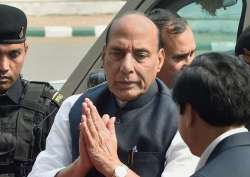Rajnath Singh calls for basic training in forensics for policemen
Praising cyber security experts for helping in curbing radicalisation using online media, Rajnath Singh said cyber forensics play a vital role in solving increasing cyber crimes.

There was a need for policemen to get basic training in forensic science as it is going to be the "most effective weapon" to deal with crimes, Union Home Minister Rajnath Singh said here today.
Detection is bigger deterrent for criminals than the nature of punishment, he said at the inaugural function of the 24th All India Forensic Science Conference organised here.
"Many police officers know little about forensics. And due to lack of knowledge, there is a risk of evidences getting corrupted or destroyed. So, it is required that policemen are given basic training in forensic science at all the police stations, and investigation officers are updated in forensics," Singh said.
Singh said the joining of hands by the police and forensic laboratories for the Centre's Crime and Criminal Tracking Network and Systems (CCTNS) -- being developed by the Home Ministry -- can open up new possibilities and change the security scenario.
"When the infrastructure is ready, it will change the security scenario," he said.
Singh also stressed on the need to create a standard operating procedure for forensic laboratories across the country so as to avoid contradictions in reports on the same subject given by different laboratories.
"Forensic reports are sometimes challenged in courts. So there should be a standard operating procedure (SOP) (for forensic laboratories) so as to avoid contradictions in different labs," he said.
The minister added that his ministry was working on a cyber crime reporting portal and a dedicated cyber crime laboratory for cyber crime against women.
"Forensic experts can be very effective in solving these crimes. The home ministry has decided to launch cyber crime reporting portal and a dedicated cyber crime laboratory to prevent cyber crime against women and children, especially those related to sexual harassment, rape, stalking, and issues related to pornography. States have also been asked to work in this direction and increase their capability to curb such crimes," he said.
Contending that for criminals, detection was a bigger deterrent than the nature of punishment, Singh said there was also a need for discussion on forensics at district level.
"Many a time people think that stronger punishment will help curb crime. But detection is the biggest deterrent than the nature of punishment. And in this, only forensic experts can help the police. Forensics is going to be the most effective weapon to deal with crime and criminal identification," he said.
Praising cyber security experts for helping in curbing radicalisation using online media, he said cyber forensics play a vital role in solving increasing cyber crimes.
Singh said instances of forensic knowledge were also seen in ancient India.
"Around 2,250 years ago, Chanakya, in his book 'Arthshastra', talked about scientific investigation to detect the cause of death. In south India, there were instances of identifying criminals using finger prints in those times."
"In ancient times, they used to put a ball of rice in the mouth of an accused and take it out after some time to ascertain whether he was the culprit or not, based on the quantum of saliva sticking to it. It was believed that a person lying produced less saliva due to fear," Singh said.